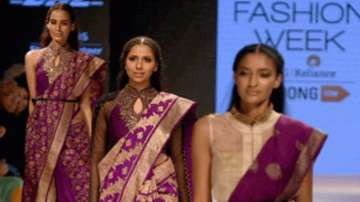National Handloom Day, marked countrywide on August 7 every year, saw leading fashion experts talk about going beyond one specific day for handloom products and celebrate #HandloomEveryday. The discussion, which took place at the Crafts Museum here, was organised by the Fashion Design Council of India (FDCI) and Ministry of Textiles. Giving a clarion call for greater adoption of handloom products, designer Ritu Kumar said that India's rich heritage of handloom differentiates us from rest of the fashion world.
The fashion icon and Padma Shri recepient, known for blending age-old crafts with a contemporary vocabulary, also said that "we can't wish away 16 million handloom weavers or their skills" and while master-weavers struggle to make ends meet, handloom sector needs solid commerce backing. Textile designer David Abraham, who is part of the fashion brand Abraham & Thakore, also linked the discourse to environment.
India's leading fashion icons call for #HandloomEveryday
"Textile industry is the second largest polluter in the world. Every garment factory is getting larger and more mechanised. The handloom weaver has the smallest environmental footprint. Speaking of fashion, handicrafts is the greatest form of luxury because it's handmade and has limited pieces," he said. National Handloom Day is marked on August 7 which sparked the Swadeshi movement -- an anti-colonial campaign to promote indigenous fabrics.
The event also had another Padma Shri recipient, Ram Kishore Chippa Derawala who is a master-printer in the Dabu and Bagru prints of Rajasthan, speak about reduction of taxes on the handloom products since they are anyway more expensive to produce. Designers Madhu Jain, Sunil Sethi and Rta Kapur Chishti also shared their views on how Indians need to relook at their handloom heritage and preserve it with the same deal as monuments. The discussion concluded with the launch of a hashtag #HandloomEveryday that urges more and more buyers to adopt handloom for daily wear. FDCI has also curated a temporary exhibition of handloom crafts of many Indian states at the Crafts Museum.

